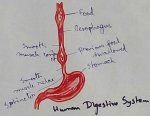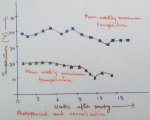Multiples
This topic would deal with multiples. Multiples of a number are actually the tables of a certain number. If we are talking about multiple of 2 then it is actually the tables of 2. When we have learnt table we have learnt the tables till 10 or 12 that is till 2 multiplied by 10 or 2 multiplied by 12 but actually they are infinite. We can go on finding the multiples of 2 beyond 10 or 12.
Important facts about multiple:
• Natural numbers start from 1 and continues till infinity and all natural numbers are multiple of 1.
• Multiples of any number continues till infinity that is there is no end.
• The first multiple of a number is the number itself
Here are few examples illustrated on multiples:
1. Write down the first 10 multiples of 2
Solution:
The first 10 multiples of 2 are:
2 × 1 = 2
2 × 2 = 4
2 × 3 = 6
2 × 4 = 8
2 × 5 = 10
2 × 6 = 12
2 × 7 = 14
2 × 8 = 16
2 × 9 = 18
2 × 10 = 20
2. Write down the first 5 multiples of 6
Solution:
The first 5 multiples of 6 are:
6 × 1 = 6
6 × 2 = 12
6 × 3 = 18
6 × 4 = 24
6 × 5 = 30
3. Write down the third, fifth, and ninth multiple of 8
Solution:
The third multiple of 8 is 3 × 8 = 24
The fifth multiple of 8 is 5 × 8 = 40
The ninth multiple of 8 is 9 × 8 = 72
4. Write down the odd multiples of 5 till 50
Solution:
The odd multiples of 5 till 50 are:
5 × 1 = 5
5 × 3 = 15
5 × 5 = 25
5 × 7 = 35
5 × 9 = 45
5. Write down the even multiples of 11 till 100
Solution:
The even multiples of 11 till 100 are:
11 × 2 = 22
11 × 4 = 44
11 × 6 = 66
11 × 8 = 88
6. Write down the third, fourth, fifth and sixth multiple of 13
Solution:
The third, fourth, fifth and sixth multiple of 13 are:
13 × 3 = 39
13 × 4 = 52
13 × 5 = 65
13 × 6 = 78
7. Write down the first 6 multiples of 15
Solution:
The first 6 multiples of 15 are:
15 × 1 = 15
15 × 2 = 30
15 × 3 = 45
15 × 4 = 60
15 × 5 = 75
15 × 6 = 90
8. Write down the first six consecutive even multiples of 20
Solution:
The first six consecutive even multiples of 20
20 × 2 = 40
20 × 4 = 80
20 × 6 = 120
20 × 8 = 160
20 × 10 = 200
20 × 12 = 240
Recent Articles
-
Eleventh Grade | Eleventh Grade Science | Eleventh Grade Math
Jun 27, 25 12:26 AM
Eleventh grade biology has been designed in accordance with the recommended topics. We will cover all the topics in biology very exciting and interesting way. -
Explain Digestion of Food | Salivary Glands | Oesophagus | Stomach
Jun 27, 25 12:20 AM
Before the digestion is start by the different enzymes secreted from the different digestive glands food must be turned and chut or mixed with saliva inside the mouth. -
Explain Human Digestive System | Mouth | Tongue | Pharynx | Teeth
Jun 21, 25 01:15 PM
Digestive system is a system of alimentary canal and digestive glands. Alimentary canal- alimentary canal is a tube of variable diameter having muscular wall and glandular epithelial tissues which sta… -
Vernalisation in Plants | Definition | Mechanism | Devernalization |
Jun 18, 25 01:34 PM
Definition of vernalisation- The change of flowering habit due to the low temperature treatment is known as vernalisation. This is a physiological process which was denoted by Clipart in 1857 invite b… -
The Food We Eat | Food we Get from Plants and Animals | Carbohydrates
Jun 15, 25 03:20 PM
What are the food that we should eat? Find out the names of ten food items in the word maze. Write the names in the correct column of the table given below. Food we get from plants Food we get from an…





New! Comments
Have your say about what you just read! Leave me a comment in the box below.